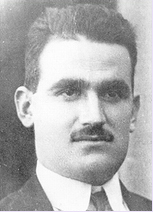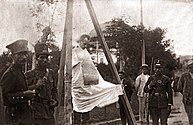
Kâzım Sevüktekin was an officer of the Ottoman Army and the general of the Turkish Army, a politician of the Republic of Turkey.

Şefik Avni Özdoğru was an officer of the Ottoman Army and of the Turkish Army. Mayor of Samsun. He was a younger brother of Talat Avni (Özüdoğru).

Ali Kılıç or Kılıç Ali Bey was a Turkish officer of the Ottoman Army and Turkish Army. He was also a politician of the Republic of Turkey. He married with Füreya Koral, one of the first Turkish ceramicists. He was appointed a judge of the Independence Tribunal in the mid 1920s. Football coach Gündüz Kılıç was his son.

Ali Saip Ursavaş, also known as Ali Saib Bey was an Iraqi-Turkish officer of Kurdish origin, having served in the Ottoman and Turkish armies, and one of the early key members of CHP.

Arslan Toğuz also known as Arslan Toğuzata, Arslan Bey was a police commissioner of the Ottoman Empire, a militia leader and politician of Turkey.

Hüseyin Avni Zaimler, also known as Hüseyin Avni Bey or Hüseyin Avni Pasha, was an officer of the Ottoman Army and a general of the Turkish Army. After the declaration of the Republic of Turkey, he became a politician and served in the Grand National Assembly of Turkey. With Mustafa Kemal Atatürk's order on November 21, 1923, Huseyin Avni received the Medal of Independence with Red-Green Ribbon, the highest decoration at the time, for his service during the Turkish War of Independence. On 24 January 1924, he was promoted to rank Mirliva. He was a descendant of the Ottoman Grand Vizier Lala Mehmed Pasha.
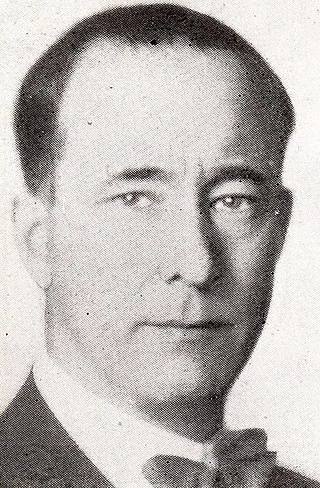
Hüsrev Gerede was a Turkish diplomat and career officer, who served in the Ottoman Army and the Turkish Army.

Selâhattin Köseoğlu also known as Çolak Selâhattin, Hüseyin Selâhattin Bey was a military officer of the Ottoman Army and the Turkish Army. He was also a politician of the Republic of Turkey.

Mustafa Elvan Cantekin was a military physician of the Ottoman Army and a politician in the Republic of Turkey. He was one of the founding members of Vatan ve Hürriyet secret society, which was just one of the several organizations opposed to the regime of the Ottoman sultan Abdul Hamid II.
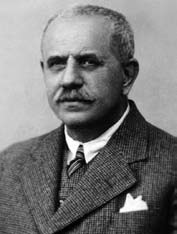
Mehmet Naki Yücekök also known as Nakiyüddin Yücekök, Nakiyüddin Bey was a Turkish career officer, politician and secularist. He served as a military officer of the Ottoman Army and as a politician of the Republic of Turkey. He was a French teacher of Mustafa Kemal at the Salonica Military School.

Ismail Fazıl Pasha, the son of Mustafa Fazl Pasha was an Ottoman general. He was commander of the Ottoman Army, a politician, statesman of the Ottoman Empire and the government of the Grand National Assembly of Turkey. He married Zekiye Hatice Hanim, who was daughter of Mehmed Ali Pasha. They had two sons, Ali Fuat Cebesoy and Mehmet Ali Cebesoy.
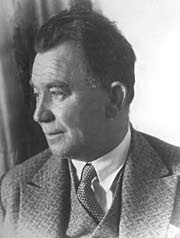
İhsan Eryavuz, also known as "Topçu" İhsan, Mehmet İhsan Bey was a Turkish career officer, government minister and politician. He served as an officer of the Ottoman Army, and as a politician of the Republic of Turkey. He became Minister of the Navy in the cabinets of Ali Fethi Bey (Okyar) and Ismet Pasha (İnönü)
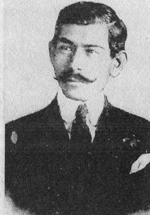
Kara Vâsıf Bey, later known as Mustafa Vasıf Karakol, was an officer of the Ottoman Army, and a politician of the Republic of Turkey. He was one of the founding members of the Karakol society and his family took the surname "Karakol" after his death.

Ömer Lütfi Yasan was a Turkish officer of the Ottoman Army, and a politician of the Republic of Turkey. He became the Minister of the Public Works in the cabinet of Mustafa Kemal Pasha (Atatürk).

Hasan FehmiAtaç was a Turkish politician and a member of both the Grand National Assembly of the Republic of Turkey and the earlier Chamber of Deputies of the Ottoman Empire. As a member of both parliaments, Hasan Fehmi was a deputy representing Gümüşhane, the place of his birth.

In 1926, the Turkish police arrested dozens of people, including ex-ministers, lawmakers and governors, accused of plotting to assassinate Mustafa Kemal, the first president of Turkey, on 14 June 1926 in İzmir. The assassination was planned to take place in the Kemeraltı district of İzmir. As Mustafa Kemal Pasha's car would have slowed down at the crossroads, Ziya Hurşit Bey would have opened fire on him from Gaffarzâde Hotel with Gürcü (Georgian) Yusuf and Laz İsmail throwing bombs and explosives at him from the barber shop under the hotel. Meanwhile, they had planned to escape from the scene with Çopur Hilmi and Giritli (Cretan) Şevki, who would wait in a car on the side street, and then send them to Chios with a motor. However, through the telegram sent to Mustafa Kemal Pasha by İzmir Governor Kâzım Bey on 14 June, the plan was uncovered and the president postponed his trip to İzmir. In the letter written by Giritli Şevki to the Governor of İzmir on 15 June 1926, information on the people who would have carried on the assassination was included. After a while, the four main suspects were arrested and they confessed their crimes.

Hüseyin Kazım Kadri or Hüseyin Kazım Bey was a Turkish statesman and writer who served as a governor and a minister in the last years of the Ottoman Empire.
Baha Cemal Zağra was a Turkish politician.
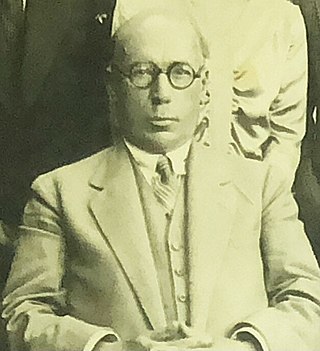
Mustafa Ferit Arsan was a Turkish politician who represented Gaziantep in the 2nd and 3rd Parliaments of Turkey, and was the leader of the local Association for Defence of National Rights in Aintab, which organized the Turkish militias against the French siege.
